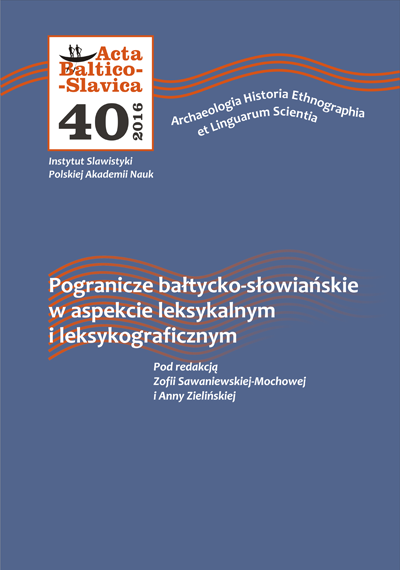Słowiańskie zapożyczenia wśród nazw pierogów w języku łotewskim
Slavic Loanwords in the Terms for Dumplings in Latvian
Author(s): Brigita BušmaneSubject(s): Cultural history, Customs / Folklore, Regional Geography, Semantics, Baltic Languages, Sociology of Culture, 18th Century, 19th Century
Published by: Instytut Slawistyki Polskiej Akademii Nauk
Keywords: Latvian language; High Latvian Dialect; Slavonic borrowings; variants of words; semantics; distribution area of words;
Summary/Abstract: Food is an essential part of the material culture of every nation. It frequently preserves national traditions and old names longer than other spheres do, additionally, it lets observe the influence of other cultures. According to dictionary data, dumplings were known in Latvia already in the 18th century. Many names for them have been attested in regional subdialects of Latvian; borrowings usually cover wide areas. In this article, basing on ethnographic and linguistic material notations of different antiquity thus tracing the use of names for dumplings almost a century long and referring to dictionary data from 18th–19th century, the author tried to reveal the use and distribution of names for dumplings of Slavic origin in subdialects of Latvian, as well as to offer fragmentary data on the use of particular Slavic borrowings in neighboring languages. The Slavic borrowings kļocka, zacirka alongside variant names are widespread in Eastern Latvia, i.e. in a rather narrow or wide area of the High Latvian dialect. In Eastern Latvia, the names klučki, klučkas derived from the Germanic borrowing kluči, with insertion of the consonant k under influence of Russian, have also been registered. From the semantic angle, the borrowings kļockas, klučkas and their variants are denoting dumplings made of various raw materials (e.g., different kinds of flour, also pea-flour, potatoes). Further references to ingredients of this food and its preparation are included in the explanation of the Slavic borrowing zacirka and its variants most typical for the peasants vocabulary in Latgale.
Journal: Acta Baltico Slavica
- Issue Year: 2016
- Issue No: 40
- Page Range: 38-59
- Page Count: 22
- Language: English

